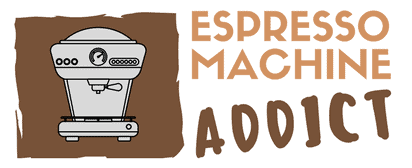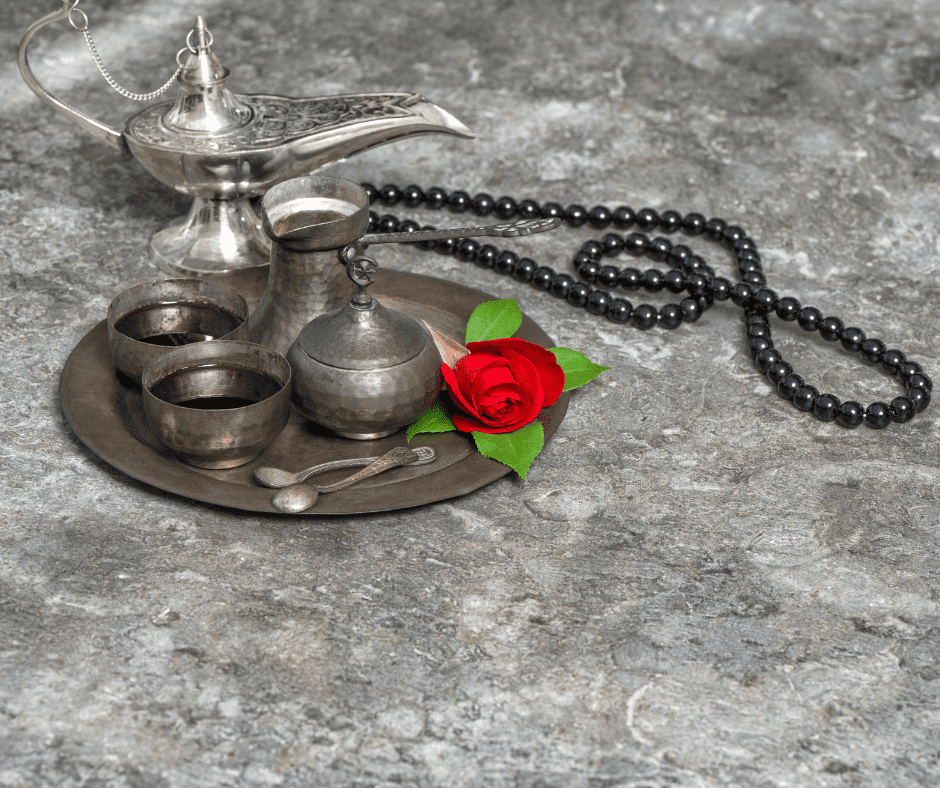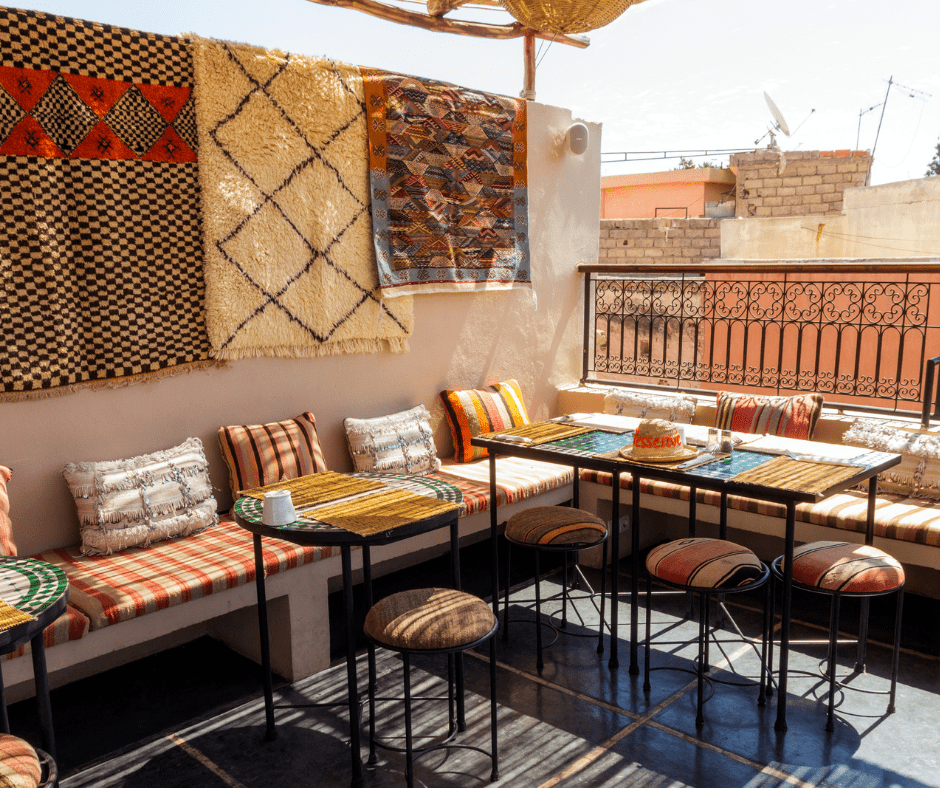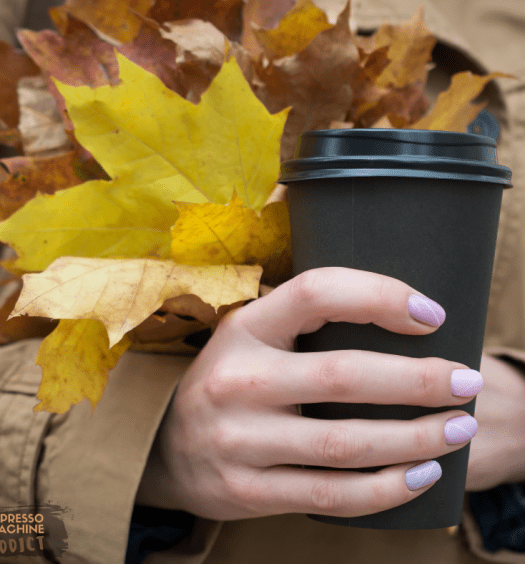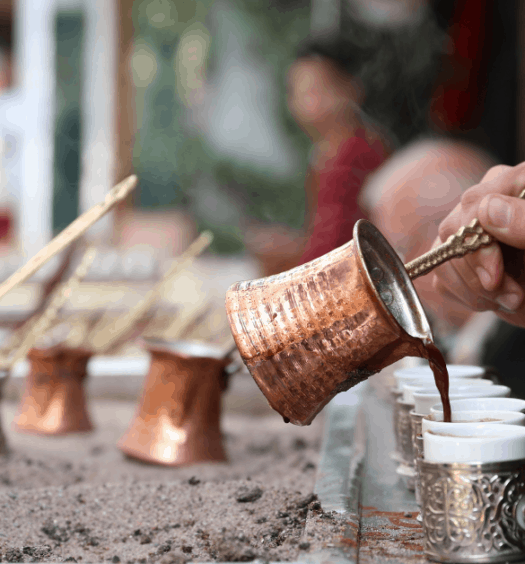People commonly romanticize Morocco due to its exotic nature compared to western cultures. Grand, colorful bazaars nestled among sprawling deserts and inviting oases often come to mind, as well as a genuine love of intriguing spices. Coffee culture in Morocco also often captivates the imagination.
Moroccan cafés often feel like a trip back in time, creations of an era long before the coffee chains that many westerners flock to for their daily caffeine fix. The relaxed atmosphere and social feel make journeys to a Moroccan coffee shop feel special, a moment to be savored instead of rushed. These cafés offer a unique experience with traditional Arabic coffee, known for its rich flavor profile enhanced by various spices and its deep cultural significance.
However, there’s much more to coffee culture in Morocco. If you’re curious about Moroccan coffee traditions, here’s what you need to know.
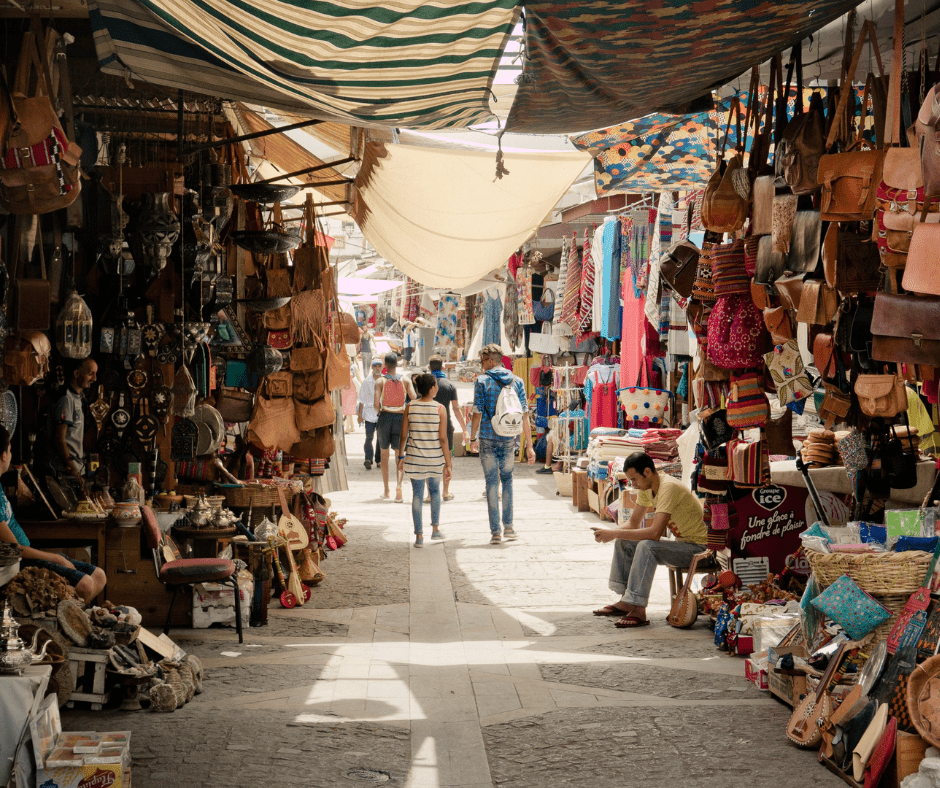
Introduction to Moroccan Coffee Culture
Moroccan coffee culture is a rich and vibrant tradition that plays a significant role in the country’s social and cultural fabric. Coffee is an integral part of Moroccan daily life, deeply rooted in the country’s history and customs. From the bustling streets of Marrakech to the serene coastal towns, the aroma of freshly brewed coffee is a common and comforting presence.
The coffee culture in Morocco is a unique blend of Arabic, French, and African influences. Introduced by Arabic traders and later influenced by European practices, Moroccan coffee has evolved into a distinctive tradition. Whether in traditional coffee shops or modern cafes, the act of drinking coffee is more than just a caffeine fix; it’s a cherished ritual that brings people together.
In Morocco, coffee is often enjoyed slowly, providing a moment of relaxation and socialization. The rich traditions surrounding coffee consumption reflect the broader Moroccan culture, where hospitality and community are highly valued. As we delve deeper into Moroccan coffee culture, we’ll explore its history, traditions, and the unique customs that make it so special.
Coffee Culture in Morocco
Coffee has been a part of the landscape in Morocco for centuries. Coffee was originally introduced to the nation by Arabic traders. However, by the 18th century, much of the nation’s coffee came through Europe. Not long after its introduction, unique coffee rituals developed, not unlike what you find with mint tea in the region. Drinking coffee in Morocco is a social activity that symbolizes community and hospitality, contrasting with the predominant tea culture.
Originally, cafés in Morocco were predominately used by male coffee drinkers. It was incredibly rare to see women in the establishments. Instead, it was a place where men could gather as friends, conduct business, or relax. While local women are now more inclined to spend time at cafés enjoying coffee, partially due to female tourists making it seem more acceptable, it isn’t uncommon for many cafés to still have far more men than women within their walls. Moroccan mint tea is considered the national drink, and Arabic coffee also holds significant cultural importance.
Generally speaking, the best coffee in Morocco relies on traditional Arabic roasting methods. One approach that’s remained part of the equation for centuries is roasting over a charcoal fire and grinding the beans using a mortar and pestle. The approach also involves roasting and grinding the beans right before use, resulting in the best overall flavor.
However, at cafés, that roasting strategy isn’t always practical. Still, many households continue with that tradition.
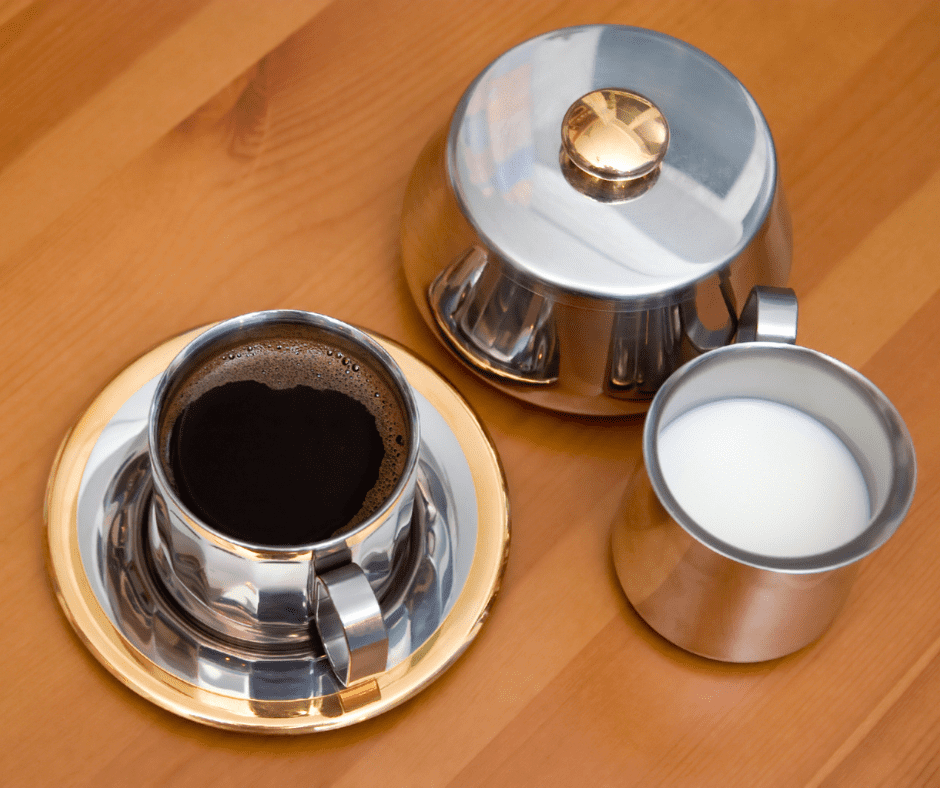
Traditional Moroccan Coffee
Traditional Moroccan coffee is steeped in tradition, but its brewing practices also shift with time. That makes the resulting culture incredibly multi-faceted, as the creator of the coffee drink’s preferred techniques and views on one of the nation’s favorite beverages play a role in how it’s made.
How coffee is brewed in local households is largely similar to what you’d find in other parts of the region. Usually, a two-phased approach is used. Water is heated, and freshly ground coffee is added. It’s returned to the heat until a foam develops, then removed from the heat until the foaming subsides. Then, the same heating process is used one or two more times. Finally, some cold water is added before serving. In some traditional preparations, hot milk is mixed with instant coffee to create a milder beverage, often enjoyed during family visits.
In some cases, an antique or vintage Moroccan coffee pot is far more ornate than you’d expect, and it is typically made of metal, such as solid brass. The spout is often attached low on the base, and the rest is curved, not unlike a goose’s or swan’s neck.
Generally, traditional Morocco coffee features Moroccan ground coffee beans paired with a range of spices, including cardamom, cinnamon, clove, ginger powder, black pepper and nutmeg. The goal is to create a flavor balance, allowing each element to bring the best out of the rest. Sometimes, orange blossom water is offered as an optional flavor enhancer for guests, allowing them to add a few drops to enrich the flavor.
When it comes to sugar use, it depends on the occasion. For gatherings that are generally considered sweet in nature – such as a wedding – sugar is commonly added to align it with the event. For more subdued or sad occasions – such as a funeral – sugar isn’t added, allowing the natural bitterness of the coffee to stand for the mood of the attendees.
Generally speaking, there are two main types of coffee beverages served in cafés in Morocco. First, you have café noir (black coffee), a small cup of Moroccan spiced espresso. It’s typically sipped and savored, creating a moment of relaxation and time for socialization.
Another popular Moroccan coffee drink is nous nous coffee, occasionally called nos nos coffee. However, that’s not the name you’ll find on the menu. Nous means “half” in Arabic, so the term refers to a coffee drink that’s half espresso and half milk. It isn’t wholly unlike a latte or a flat white, though its preparation can differ slightly.
Sometimes, when you order nous nous coffee, you’ll receive a cup of espresso and milk served on the side. That allows you to adjust the ratio to your liking. However, some use standard ratios of half espresso and half milk.
Qahwa ma’atra is a name specifically for moroccan spiced coffee. It’s more commonly prepared at home, though some cafés – particularly those in large cities frequented by travelers – may have a version available to appeal to foreigners interested in exploring the flavors.
In some cases, you’ll also find coffee drinks that are common in cafés in other countries. For example, Moroccan cafés in large cities may feature lattes and cappuccinos. Café Americanos are also quite prevalent, and some may also feature Moroccan spice coffee for some flare.
It isn’t uncommon to receive a small bottle of water when you order coffee at higher-end cafés. These essentially come free with your order, so feel free to enjoy it if it’s offered.
Additionally, when you order coffee, you’ll usually have access to plenty of sugar. There is no standard to how much you need to add, so you can put in as much as you like based on your taste preferences.
How to Order Coffee in Morocco
Ordering coffee in Morocco is relatively straightforward. If you prefer milk in your coffee, you can simply ask for nous nous coffee and will typically get what you want, even if it isn’t specifically listed on the menu. Requesting café noir will get you a small cup of espresso, which may or may not be a spiced version.
Moroccan mint tea is also widely available in cafés and is an integral part of the café culture.
If you specifically want Moroccan spiced coffee, you can ask for qahwa ma’atra. However, this isn’t something all cafés make since it isn’t classically made with espresso, which is what most cafés offer. Instead, it’s a coffee drink. However, if you ask for a flavor profile similar to qahwa ma’atra, the coffee shop may be able to recommend a similar spiced espresso drink.
Many cafés also offer a variety of more conventional espresso drinks. Café Americanos are widely available and can stand in well for a traditional drip coffee. You might also see lattes, espressos, and a variation on the dirty chai, an espresso drink that features chai tea-style spices and milk.
When it comes to sugar, it isn’t typically added to your espresso drink for you. Instead, they’ll provide you with sugar, and you can add it on your own, allowing you to customize the amount to suit your taste. Usually, sugar is automatically provided, but you can also ask for some if it isn’t.
One unique aspect of coffee culture in Morocco is that not all coffee shops serve coffee or espresso made from fresh coffee beans. In some smaller towns, the coffee shop doesn’t have their own coffee machines or espresso makers. Instead, they’ll turn to instant coffee to make the drinks, which could be disappointing to those who aren’t expecting instant coffee. As a result, before you order coffee in Morocco, you may want to observe how the drinks are created to see whether instant is part of the recipe.
Coffee Ordering Mistakes in Morocco
In most cases, it’s hard to make a mistake when ordering coffee in Morocco. One of the biggest missteps is likely expecting a variety of flavored syrups like you would find in western chain coffee shops. As a result, asking for a flavored espresso drink isn’t typically wise, primarily since the coffee shop likely doesn’t have what you’re requesting.
Another one of the most critical points to keep in mind is that if you order “coffee,” you typically aren’t getting drip coffee. Instead, the term is viewed as interchangeable with “espresso” in many coffee shops. As a result, if you want a beverage closer to a drip coffee, you may want to try a café Americano instead.
Additionally, ordering takeaway coffee isn’t common in Morocco. While some coffee shops in cities frequented by travelers may offer it as an option, that approach doesn’t align with Moroccan coffee culture. If you’re in a small coffee shop in a less visited city, requesting a to-go cup could be met with a raised eyebrow, or you may find that a takeaway coffee cup just isn’t available.
Finally, in some cases, requesting additional espresso shots in a drink is a bit frowned upon. Mainly, this is because Moroccans don’t treat coffee as simply a means to consume caffeine. Instead, it’s meant for relaxing and savoring the moment. Again, while some cafés may accommodate the request, others might prefer not to alter their recipes.
Coffee Shops in Morocco
Coffee shops in Morocco are an integral part of the country’s social fabric. These bustling hubs of activity are where people gather to socialize, relax, and enjoy a cup of coffee. Traditional coffee shops, known as “cafes maures” or “ahwas,” are found in almost every town and city in Morocco. These cafes are often adorned with traditional Moroccan tiles and furnishings, offering a warm and welcoming atmosphere.
In these traditional settings, the focus is on creating a space where people can unwind and connect. The decor often includes intricate tile work, wooden furniture, and vibrant textiles, reflecting the rich cultural heritage of Morocco. Patrons can enjoy a variety of coffee drinks, from the robust café noir to the creamy nous nous coffee.
In addition to traditional coffee shops, Morocco is also home to modern cafes that cater to a diverse clientele. These contemporary establishments serve a range of espresso-based drinks, including cappuccinos, lattes, and Americanos. The blend of old and new creates a dynamic coffee culture that appeals to both locals and visitors.
Whether you’re in a traditional cafe or a modern coffee shop, the experience of drinking coffee in Morocco is about more than just the beverage. It’s about the ambiance, the conversation, and the sense of community that these spaces foster.
Etiquette and Customs
Drinking coffee in Morocco is not just about consuming a beverage; it’s an experience that involves etiquette and customs. When visiting a Moroccan home, it’s customary to be offered a cup of coffee as a sign of hospitality. Refusing a cup of coffee is considered impolite, and it’s customary to take at least a few sips to show appreciation.
In Moroccan cafes, the act of drinking coffee is a social affair. It’s customary to sit and socialize with others, rather than rushing to finish your drink. The relaxed atmosphere encourages patrons to take their time, savoring both the coffee and the company.
Coffee in Morocco is often served with sugar and spices, allowing each person to customize their drink to their taste. Adding sugar to your coffee is a common practice, and it’s usually provided alongside your cup. The use of spices like cinnamon and cardamom adds a unique flavor, making each cup of coffee a sensory experience.
The customs surrounding coffee consumption in Morocco reflect the broader cultural values of hospitality and community. Whether you’re in a bustling cafe or a quiet home, the act of drinking coffee is a moment to be cherished and enjoyed.
Moroccan Coffee Brands
Generally speaking, there aren’t many Moroccan coffee brands. Instead, Moroccans largely rely on European brands, such as Lavazza or Cafés Carrion.
However, there are a few Moroccan coffee brands. One example is Bacha Coffee, which was founded in Marrakesh. Bloom Coffee is a specialty roaster in Morocco that’s also highly popular. With these, you’ll find a range of roasts, along with spiced and unspiced coffees.
You can also find Moroccan coffees made by a wide array of international brands. Generally, you’ll find blends designed to mimic more traditional Moroccan spiced coffees or roasts that align with the preferred coffee profile that aren’t spiced. However, they aren’t necessarily produced in Morocco.
Travel with us as we explore coffee culture in Cuba and Vietnam.
